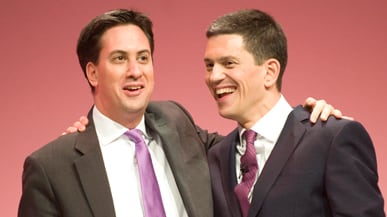For many Americans, their most indelible impressions of British politics come from Masterpiece Theater—and most likely from Yes Minister than from Shakespeare or Trollope. Immersed in our own troubles, we have given scant attention to a real British drama, the contest for leadership of the British Labour Party between David and Edward Miliband, elder and younger sons of a deceased British academic, Ralph, and his emphatically surviving wife, Marion. Now Edward, who was minister for energy in the government of his political patron, Gordon Brown, has won. David, foreign secretary under Brown but originally brought into government by his sponsor, Tony Blair, started as favorite, and lost narrowly. He has promised to stay in politics but this week announced that he would not have a role leading the party. The British media have shown the brothers embracing after the announcement of the result, but with the indefatigable relentlessness of British journalism, they are already turning to tomorrow’s trivia.

The matter is not trivial. The present coalition government of Conservatives and Liberal Democrats may falter or founder. A successful leader of the opposition could be prime minister five years from now, or perhaps even sooner. The long reigns of Margaret Thatcher and Blair showed that the British wish their prime ministers to be presidential—omnipresent and omnipotent. Blair’s successor Gordon Brown was tortured by his Scots Calvinist self-doubt and packed off with scant thanks. Is the new leader, a reflective intellectual who may actually believe a different society is possible, likely to convince a divided and skeptical electorate that he has what it takes?
I know Edward slightly. As an intern at The Nation in 1989, he was an amiable and assiduous fact-checker of my copy. He was followed in that role in 1991 by Nick Clegg, the Liberal Democratic leader and deputy prime minister. Founded in 1865, The Nation has finally reached the commanding heights of politics—British politics. There is a member of our editorial board, myself, who sometimes thinks that North American democracy would have been better had we remained within the old empire rather than starting our own.
Edward’s victory, in any event, made me nostalgic.
From 1953 to 1959, I was his father’s colleague on the faculty of the London School of Economics. We co-taught seminars, and participated in the British New Left, which preceded those on the Continent and in the U.S. by a good five years. Edward’s mother was then an especially vivacious LSE student, the kind that makes one think that sometimes youth is not wasted on the young. Ralph was the last protégé of his famous teacher, Harold Laski, heir to his obdurate belief in socialism, and no less profound conviction that no earthly movement, party or state could possibly incarnate it. Ralph did not attend synagogue, but had a truly rabbinical morosity about a fallen world, and an unfailingly sardonic eye for human failings. Rosa Luxemburg said that all revolutions fail but the last one and Ralph was a tireless servant of the commonwealth to come. He was a frank and loyal friend.
Ralph had escaped the German occupation of Belgium on one of the last boats to England, arriving with his father in 1940. The father, a leather worker, had fled the persecution and poverty of pre-war Poland to Belgium. Ralph’s mother and sister remained in Belgium, where farmers hid them from the Germans. Ralph arrived with French and Yiddish, learned English, began studies at the LSE, and served in the Royal Navy. He had to struggle after the war for permission for his father to remain (he might have been deported to Poland had he been returned to Belgium). They could not at first obtain visas for his mother and sister. The Labour home secretary who was so very stringent held the constituency for which Edward now sits.
Marion’s family from Jewish Poland were richer. Her father and grandfather were murdered and their property seized, but she, her sister, and mother survived—helped by Jews and non-Jews. Marion, 11 years younger than Ralph, came to England in 1947 at 13 with virtually no schooling but made up lost ground very rapidly.
Their house in now-fashionable Primrose Hill, between central London and Hampstead, was frequented by the intellectual and political elite of the trans-Atlantic left. Ralph’s closest American friend was the combative and influential adversary of American power, C. Wright Mills (David Miliband’s middle name is Wright). Ralph, sorely disappointed when the LSE dismissed junior colleagues who had supported student protests, took a chair at Leeds in 1969, left that in 1975 for a long series of visiting appointments in the U.S. before he died in 1994. His sons had some years in American schools, before attending Oxford.
My own connection with Ralph became attenuated after I left London in 1959 for Oxford and then left Europe to return to the U.S. in 1966. I became more involved in the politics of the Democratic Party, deepened my connections to the European socialist and social democratic parties just as Ralph was formulating a stern version of socialism. Of course, I visited Ralph and Marion when I came to the U.K.—and admired his intellectual and moral fecundity.
Clearly, the sons learned much at the family dinner table. Still, there is an apparent gulf between their father’s prophetic challenge to the conventional political wisdom (set down in a number of widely read books) and their willingness to practice profane politics. To some extent, their mother’s sense of the demands of ordinary life was their bridge across the abyss. Their father came to Britain as an adolescent, and looked at it with the eyes of a stranger. His scholarly interest in radical British democracy (the Puritan revolutionaries impatient with Cromwell, for instance) was a search for spiritual roots. The sons, not least due to the travail of their father, obviously think of Great Britain as home—and have been freer to choose wider political paths.
There is an apparent gulf between their father’s prophetic challenge to the conventional political wisdom (set down in a number of widely read books) and their willingness to practice profane politics.
In both their father’s and mother’s families, the horror of the European past was mitigated by the solidarity of strangers. The U.K. has had a Jewish party leader in the recent past, Michael Howard of the Conservatives. Edward’s election as Labour’s leader is very unlikely to evoke a large public outcry in Great Britain for his birth certificate. Edward’s familial past may well make him a figure well able to lead a nation struggling with its post-imperial present. His own reworking of that past is evidence that he possesses authentic political gifts.
Norman Birnbaum is university professor emeritus, Georgetown University Law Center, and is on the editorial board of The Nation. He is a columnist for El Pais and Tageszeitung. His most recent book is After Progress: American Social Reform And European Socialism in the Twentieth Century (Oxford University Press, 2001).






